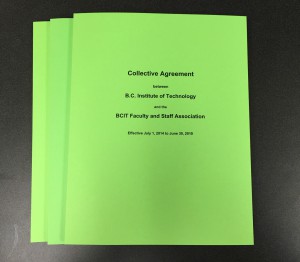
Negotiations and Consequences
This is one in a 2016 series from the desk of the FSA Executive Director, Paul Reniers.
July 20th Edition
The Collective Agreement is Here!
Nine months after it was ratified by FSA members, but just eight months after it was ratified by the employer, paper copies of the new collective agreement have been reproduced. Believe it or not, that’s a significant improvement over previous recent agreements, due in part to some significant housekeeping work done during negotiations. Nonetheless, and despite the collective agreement not expiring for almost three more years, it’s already out of date. The provincial government’s Economic Stability Dividend has thrown off the pay scales for the remainder of the agreement. Updated payscales are posted on-line. Limited print copies of the new agreement, resplendent in FSA green, are available from HR or the FSA. Members are encouraged to access the agreement on-line instead.
Other New Collective Agreements
We’re not the only ones with a new collective agreement. The BC Nurses Union ratified a new agreement in May. Although the deal is considered to be within the provincial government’s 5.5% bargaining mandate, it also includes new payscales and staffing provisions that seem hard to reconcile with the mandate as applied in the post-secondary sector. The SFU Faculty Association reached a tentative agreement with its employer that also includes scale restructurings and other changes that were not possible under the Post-Secondary Employers’ Association. That agreement follows the collective agreement for the UBC Faculty Association that was decided by arbitration on March 31 that blatantly exceeds the provincial mandate. We will be scrutinizing these agreements for lessons on how to maximize benefits to members under the bargaining mandate.
Major Expansion Planned to Specialty Nursing
Part of the BCNU agreement includes a commitment to train nurses for 850 new specialty nursing positions. In May, Children’s Hospital announced that it had to postpone surgeries because of a shortage of OR nursing specialists. Most of that training will happen at BCIT, presuming we can find sufficient nursing specialists prepared to take a pay cut and loss of overtime, allowances, and seniority to try out teaching. The FSA is looking to work with BCIT to find ways to facilitate the expansion of the program in a challenging environment.
 Minister Visits FSA
Minister Visits FSA
Specialty Nursing was one of the topics of discussion when Minister of Advanced Education Andrew Wilkinson visited the FSA on June 28. Rob Kreuger from Specialty Nursing demonstrated a number of innovative strategies developed at BCIT to provide students with a wide variety of practical learning tools. Jaimie Borisoff and Joe Newton toured the minister through the applied research lab in the CARI building. By highlighting innovative work being undertaken by our members, we believe we’ve demonstrated that we are an effective group to work with and invest in.
New BCIT Childcare Spaces
The provincial government announced funding for an expansion of child care spaces at BCIT as part of a province-wide major capital funding program. The Student Association’s child care centre, which also provides spaces for faculty and staff, will expand from 25 to 62 spaces. The new spaces are badly needed, although infrastructure is only part of the challenge in supporting parents and young children. The FSA has endorsed the $10 A Day child care plan to make quality child care more accessible.
Indigenizing the Academy
In the wake of the report of the Truth and Reconciliation Commission and its numerous recommendations regarding indigenous education, new attention is being given to the treatment of indigenous issues, learners, and professionals in post-secondary institutions. University Affairs published a feature article on efforts being made a institutions across Canada (before our own Diversity Circles project was launched and received federal funding). CAUT has produced a document outlining how to acknowledge traditional territories at all institutions where its members work. We’ll see that BCIT is included in the next edition. CAUT has also produced its own commentary on indigenizing post-secondary education.
Leave a reply →
